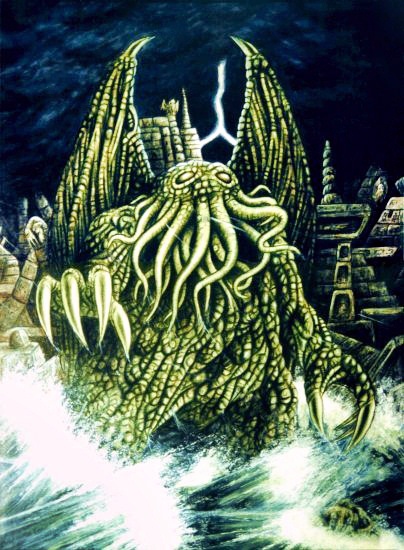The blog to end all blogs. Reviews and comments about all and everything. This blog is NOT affiliated with YouTube, Wikipedia, Microsoft Bing, Gemini, ChatGPT or any commercial vendor! Links don´t imply endorsement. Many posts and comments are ironic. The blogger is not responsible for comments made by others. The languages used are English and Swedish. Content warning: Essentially everything.
Friday, August 17, 2018
Nothing the U.S.S. Enterprise can´t destroy
So I've finally read “The Call of Cthulhu” by H P Lovecraft, mostly because “everyone” (actually two bloggers I follow) mention the Old Ones on a semi-regular basis. One of the bloggers, let's call him Wilcox, believes that Lovecraft's horror stories has captured the real character of the universe, not absolutely literally of course, but definitely in a psychological sense. The other blogger, let's call him Lagrasse, takes Lovecraft as satire and would like to get invited for lunch over at R'lyeh!
My reactions to “The Call of Cthulhu” fall somewhere in between. Living in the cozy welfare state of Sweden, being on holiday and just having imbibed an excellent cup of joe, I can't say that Lovecraft's descriptions of Satanic cults, human sacrifice and alien green octopi scared the living daylights out of me. And yes, the satiric element is obvious. Had I been in a more paranoid state of mind, my reactions might have been very different…
I can understand why “The Call of Cthulhu” is considered a classic of horror fiction. Lovecraft's story is based on a lingering suspicion many people have – the suspicion that the world isn't what it seems to be, that dark, unknown and frankly *evil* forces lurk beneath the horizon, and that these evil forces are actual creatures rather than abstract principles. Above all, Lovecraft taps our fears that evil is stronger than good, that the universe wasn't created by a benign Platonist demiurge or Christian god, and that the real movers and shakers of the cosmos will return soon…unless, of course, they never left in the first place. These fears don't have to be “literal” and might go along just fine with atheism-materialism. Except sometimes. I can't be the only person who sees similarities between Lovecraft's fiction and, say, John Keel's non-fiction. We even have an unconscious purveyor of Cthulhu's satirical dimension in David Icke.
As for the story itself, the appearance of the dread Cthulhu at the end of the novella struck me as a veritable anticlimax, after all the suspense and tension building up to it. The Great Old One comes across as a greener and zanier, but not necessarily creepier, version of that boring monstrosity Moby Dick, and he fails to stop some of the seamen who discovered his island from escaping. Somehow, I get the feeling that a really huge war vessel could destroy this Thing!
So I suppose everything is alright, then.
Or…?
Subscribe to:
Post Comments (Atom)

No comments:
Post a Comment